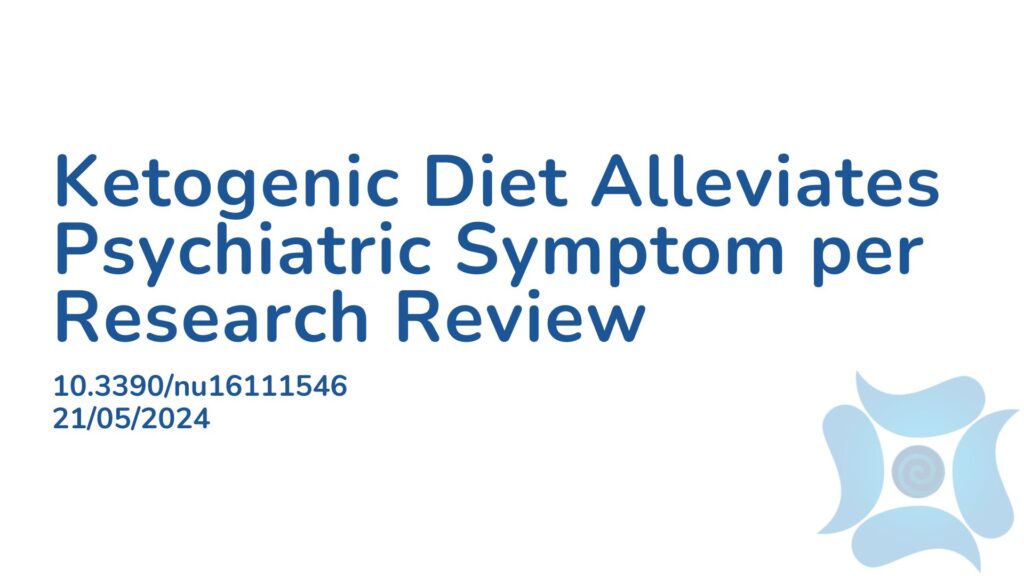Summary:
The ketogenic diet (KD) is characterized by the production of ketones, which provide an alternative energy source for the central nervous system and other tissues. The KD is high in fat (65–80% of total energy), moderate in protein (20–25%), and low in carbohydrates (5–10%). It was first introduced to treat drug-resistant epilepsy; however, today it has expanded beyond epilepsy treatment and is used for its potential benefits in obesity, neurological disorders, and even cardiovascular health. With the global rise in mental health conditions such as anxiety, depression, schizophrenia, and bipolar disorder, there is increasing interest in non-traditional treatments like the KD. First-line drug therapies, while common, often have severe side effects. This review aims to summarize the KD’s potential in preventing and treating psychiatric disorders in both animals and humans. It also explores the challenges of implementing the KD in clinical settings, such as adherence, monitoring metabolic parameters, and personalizing treatment. The results indicate that existing research consistently shows promising outcomes, suggesting that the KD may help alleviate symptoms of these psychiatric conditions. The authors noted, however, that many studies report high dropout rates and lack compliance measurements. While the available evidence is encouraging, there is a strong need for larger, long-term, randomized, double-blind, controlled clinical trials to determine whether the KD could serve as a potential preventive or co-treatment option for stress, anxiety, depression, schizophrenia, and bipolar disorder.
Abstract:
Background: The ketogenic diet (KD) has been highly developed in the past for the treatment of epileptic pathological states in children and adults. Recently, the current re-emergence in its popularity mainly focuses on the therapy of cardiometabolic diseases. The KD can also have anti-inflammatory and neuroprotective activities which may be applied to the prevention and/or co-treatment of a diverse range of psychiatric disorders. Purpose: This is a comprehensive literature review that intends to critically collect and scrutinize the pre-existing research basis and clinical data of the potential advantageous impacts of a KD on stress, anxiety, depression, schizophrenia and bipolar disorder. Methods: This literature review was performed to thoroughly represent the existing research in this topic, as well as to find gaps in the international scientific community. In this aspect, we carefully investigated the ultimate scientific web databases, e.g., PubMed, Scopus, and Web of Science, to derive the currently available animal and clinical human surveys by using efficient and representative keywords. Results: Just in recent years, an increasing amount of animal and clinical human surveys have focused on investigating the possible impacts of the KD in the prevention and co-treatment of depression, anxiety, stress, schizophrenia, and bipolar disorder. Pre-existing basic research with animal studies has consistently demonstrated promising results of the KD, showing a propensity to ameliorate symptoms of depression, anxiety, stress, schizophrenia, and bipolar disorder. However, the translation of these findings to clinical settings presents a more complex issue. The majority of the currently available clinical surveys seem to be moderate, usually not controlled, and have mainly assessed the short-term effects of a KD. In addition, some clinical surveys appear to be characterized by enormous dropout rates and significant absence of compliance measurement, as well as an elevated amount of heterogeneity in their methodological design. Conclusions: Although the currently available evidence seems promising, it is highly recommended to accomplish larger, long-term, randomized, double-blind, controlled clinical trials with a prospective design, in order to derive conclusive results as to whether KD could act as a potential preventative factor or even a co-treatment agent against stress, anxiety, depression, schizophrenia, and bipolar disorder. Basic research with animal studies is also recommended to examine the molecular mechanisms of KD against the above psychiatric diseases.
Article Publication Date: 21/05/2024
DOI: 10.3390/nu16111546



